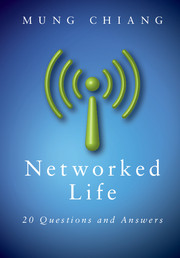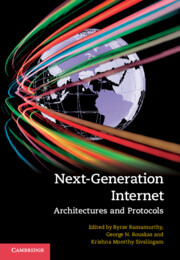Networked Life
How does Google sell ad space and rank webpages? How does Netflix recommend movies and Amazon rank products? How can you influence people on Facebook and Twitter and can you really reach anyone in six steps? Why doesn't the internet collapse under congestion and does it have an Achilles' heel? Why are you charged per gigabyte for mobile data and how can Skype and BitTorrent be free? How are cloud services so scalable and why is WiFi slower at hotspots than at home? Driven by twenty real-world questions about our networked lives, this book explores the technology behind the multi-trillion dollar internet and wireless industries. Providing easily understandable answers for the casually curious, alongside detailed explanations for those looking for in-depth discussion, this thought-provoking book is essential reading for students in engineering, science and economics, for network industry professionals and anyone curious about how technological and social networks really work.
- Provides simple, easily understandable answers for the casually curious, alongside longer, more detailed explanations for those looking for in-depth discussion
- Just-in-time teaching introduces key concepts as needed, avoiding unnecessary over-complication
- Examples are based around well-known real-world services and technologies, making it easy to relate theory to practice
Reviews & endorsements
'How do the networks, which we increasingly rely upon in our everyday life, actually work? This book is an inspiring romp through the big ideas in networking, which is immediately rewarding and will motivate later courses.' Frank Kelly, Professor of the Mathematics of Systems and Master of Christ's College, University of Cambridge
'We are entering a new Internet era - the era of the likes of Google, Amazon, Netflix, and Facebook with entirely new types of problems. This book captures the new era, taking a fresh approach to both topic coverage and pedagogic style. Often at the end [of] a section it leaves the reader asking questions; then exactly those questions are answered in the subsequent section. Every university should offer a course based on this book. It could be taught out of both ECE or CS departments at the undergraduate or graduate levels.' Keith Ross, Leonard J. Shustek Chair Professor in Computer Science, Polytechnic Institute of New York University, and co-author of Computer Networking: A Top-Down Approach
'Mung Chiang's Networked Life has an intriguing premise and an ambitious vision … Chiang's framing of the material as 20 intriguing questions about networks, their architectures, and associated phenomena ties theory to practical systems that students encounter every day … Chiang's course surely pushes the boundaries of the traditional lecture, and the book similarly is meant to be a next-generation work.' Lynn Andrea Stein, Science
'… an engaging undergraduate textbook that explains the foundations of many of the networks that now are part of our daily routine … The author organizes the material in the Socratic style, using practical questions instead of the more common (dry) survey of concepts and techniques. It provides just enough information to whet the reader's appetite and spur interest in networks …' Fernando Berzal, Computing Reviews
Product details
November 2012Hardback
9781107024946
503 pages
253 × 188 × 23 mm
1.16kg
300 b/w illus. 20 tables 100 exercises
Available
Table of Contents
- 1. What makes CDMA work for my cell phone?
- 2. How does Google sell ad space?
- 3. How does Google rank webpages?
- 4. How does Netflix recommend movies?
- 5. When can I trust product ratings on Amazon?
- 6. Why does Wikipedia even work?
- 7. How do I viralize a YouTube video and tip a Groupon deal?
- 8. How do I influence people on Facebook and Twitter?
- 9. Can I really reach anyone in 6 steps?
- 10. Does the Internet have an Achilles' heel?
- 11. Why do AT&T and Verizon Wireless charge me $10 a GB?
- 12. How can I pay less for my internet connection?
- 13. How does traffic get through the internet?
- 14. Why doesn't the internet collapse under congestion?
- 15. How can Skype and BitTorrent be free?
- 16. What's inside the cloud of iCloud?
- 17. Netflix, iTunes, IPTV: which way to watch video?
- 18. Why is WiFi faster at home than at a hotspot?
- 19. Why am I only getting a few percent of advertised 4G speed?
- 20. Is it fair that my neighbour's iPhone downloads faster?







